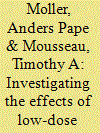| Srl | Item |
| 1 |
ID:
156550


|
|
|
|
|
| Summary/Abstract |
This article looks at how Belarus, the most affected state by the Chernobyl nuclear disaster, discursively constructs cooperation with foreign countries that provide help in combating the consequences of the tragedy. It shows that different representations of foreign actors handling the prolonged consequences of the Chernobyl nuclear disaster contribute to developing new friendships (with Japan), questioning existing cooperation (with Russia), and softening old (with Germany) and current (with Europe) conflicts in Belarus. The article makes a contribution to three debates in identity literature in constructivist International Relations: (a) identity and foreign policy; (b) the ‘voice’ and agency of the ‘Rest’; and (c) identity and difference. It is argued that when small non-Western states (help receivers) construct an ethical identity of bigger Western and non-Western states (help providers), they challenge the existing temporal and spatial identities of old strangers, enemies, and friends and create a new platform for conflict and cooperation.
|
|
|
|
|
|
|
|
|
|
|
|
|
|
|
|
| 2 |
ID:
124594


|
|
|
|
|
| Publication |
2013.
|
| Summary/Abstract |
The disasters at Chernobyl and Fukushima released large amounts of radioactive material, equivalent to many hundreds of nuclear bombs the size of those at Hiroshima and Nagasaki. Currently, there is worldwide interest in the effects of so-called low-dose radiation on public health and on biological systems from molecules to ecosystems. Research efforts to quantify these effects constitute a curious mixture of Soviet science, research by independent scientists, and research supported by the nuclear industry. The article explains how navigating between these diverse efforts can be reconciled to synthesize available information to the benefit of the general public and the policymaking community.
|
|
|
|
|
|
|
|
|
|
|
|
|
|
|
|